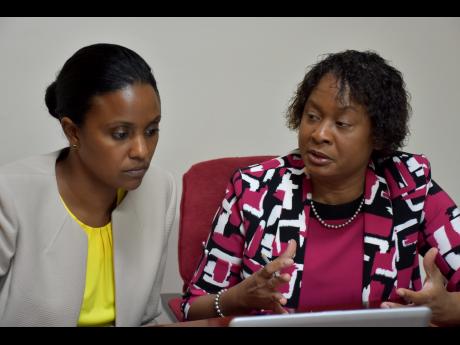Unfair to the infants - 68% of teachers in Jamaica’s early childhood institutions unqualified
The shortage of trained teachers continues to hurt local early childhood institutions (ECIs) despite major strides in the sector last year.
Only 32 per cent of teachers operating in Jamaica's basic schools, nurseries, infant schools and other ECIs satisfy the minimum required qualification of a diploma from a teacher-training institution.
According to the data prepared by the Early Childhood Commission (ECC), just over 3,400 of the 10,000 teachers at locally ECIs are trained to the vocational level while a further 3,375 are educated to the secondary level or below.
Head of the board of directors of the ECC, Trisha Williams-Singh, last week told The Sunday Gleaner that the shortage of trained teachers is a disheartening reality but one that must be endured.
"If you go out in the field, one of the biggest challenges is teacher qualification because that is required in standard one," said Williams-Singh, as she noted that local ECIs are judged on 12 basic operational standards.
"The practitioners will push back and say that they are not being paid as a teacher, and you have to look to the flip side, which is that up to 80 per cent of the basic schools are privately owned.
"When you work at a government infant school, the teachers are paid by the Government and so they get the benefits that every teacher has. The teachers at the privately owned school only get a subsidy," added Singh, as she noted that most ECIs cannot afford to pay the teachers or give them privileges to allow them to acquire higher qualification.
Approximately 2,700 ECIs now operate across the island, with 12 per cent operated by the Government.
So far, 108 of the ECIs have been certified as meeting the 12 operational standards set by the ECC. Most of the other institutions have met 50 per cent of the operating standards and have been given permits to operate.
A permit to operate is issued by the ECC to ECIs which meet all the critical health and safety requirements. Last year, 130 permits were issued by the ECC, a 12 per cent increase over 2016.
But Williams-Singh noted that there are some ECIs which have met less than 30 per cent of the standards. She charged that this was not good enough.
"Another aspect that is very challenging, and requires a lot of money, is the per-child ratio to classrooms. That is big," said Williams-Singh, as she echoed the often-repeated call for the Government to create more infant schools.
She noted that many of the ECIs have more students than recommended, resulting in toilet facilities being overused and breaching the ECC's standard of no more than 20 children to a toilet.
Singh added that in some ECIs there is only one bathroom, causing adults to use facilities designated for children.

